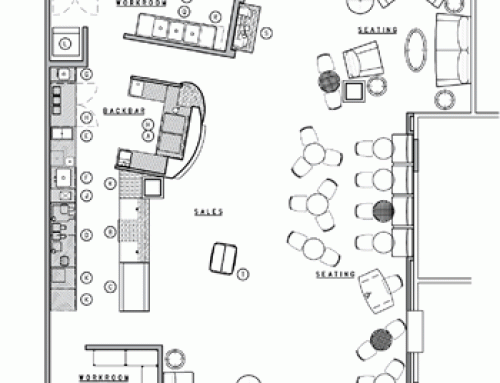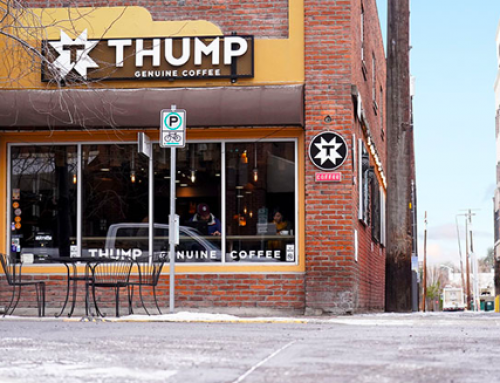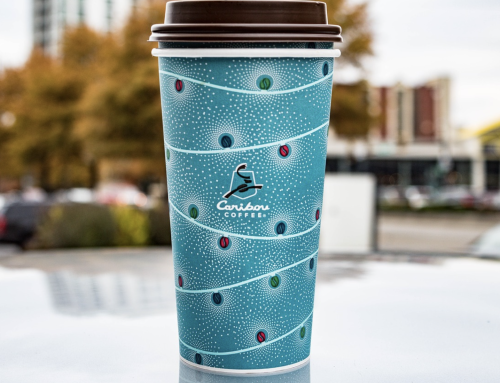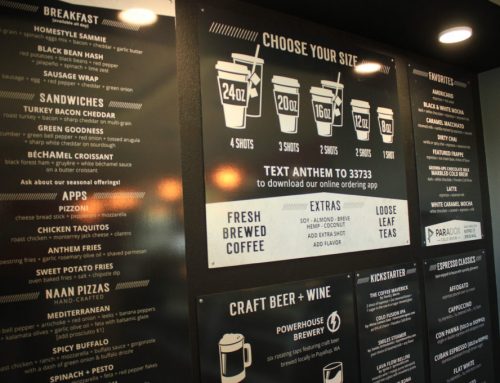According to the Coffee Shop Owners Survey of 232 coffee shop business owners conducted in April of 2019, between 50% – 74% of independent coffee shops will fail in the first five years. That’s not an alluring success rate. But why is failure rate so high?
To get the answer we reached out to survey independent coffee shop owners located in the United States, Canada, and United Kingdom for their perspective on the top reasons coffee shops fail. Our goal was to identify the common causes for failure so that you know what to avoid in your own business.
A grand total of 232 independent coffee shop owners responded to our survey and the responses were enlightening to say the least.
Key Survey Findings
What’s the Biggest Reasons Independent Coffee Shops Fail?
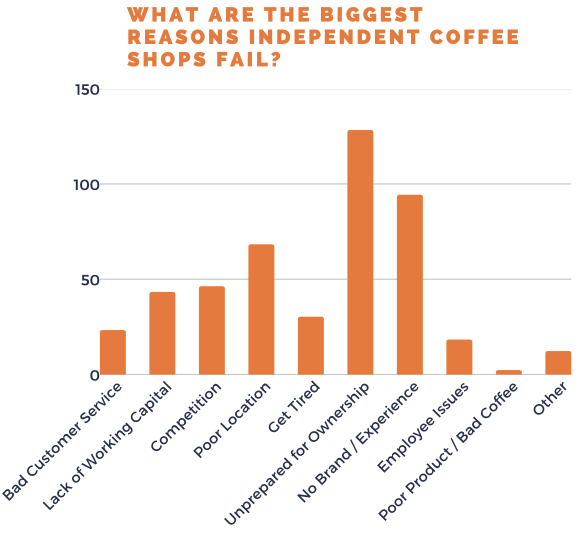
- Poor customer service – 23 responses
- Insufficient working capital – 43 responses
- Competition – 46 responses
- Poor location – 68 responses
- Get tired / Worn out – 30 responses
- Employee Challenges (hiring, cost) – 18 responses
- Unprepared for business ownership – 128 responses
- No Distinct Brand / Experience – 94 responses
- Poor Product / Bad Coffee – 2 responses
- Other – 12 responses
Summary: Each respondent in our survey was asked to select the top two reasons that coffee shops in their area go out of business.
- The number one reason failure cited within coffee shops is being unprepared for ownership according to the survey (55% of respondents listed this as a primary reason). Put simply, new coffee business owners don’t know what they’re getting themselves into when starting this business. Many are not aware of the complexities of the business. Judgement is often clouded by what the dream of owning a cafe will really be like. What’s unfortunate is this cause of failure is reduced through training and education.
- The second biggest reason was lack of a unique brand or customer experience for guests. 40.51% of the responses included this cause of failure. Building a recognizable brand and mission statement is a key requirement for success according Bryan Reynolds, Co-Founder of Anthem Coffee & Tea.
- Surprisingly, serving bad coffee was almost never the reason a coffee shop closed down. Less than 1% of those surveyed gave this response.
Based on Your Experience, What Percentage of Independent Coffee Shops Do You Think Fail in the First Five Years?
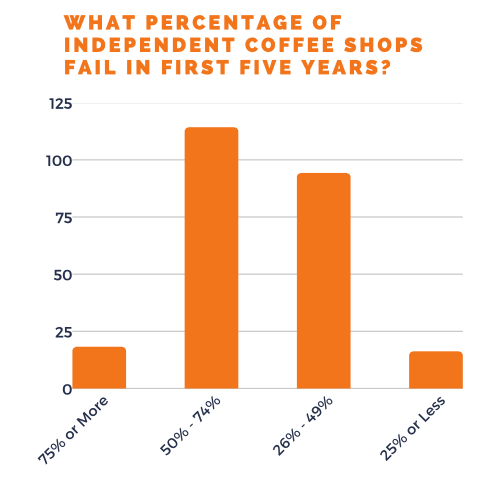
- 75% or More Fail – 18 responses
- 50% – 74% Fail – 114 responses
- 26% – 49% Fail – 84 responses
- 25% or Less Fail – 16 responses
Summary: Reputable data is scarce on coffee shop failure rates. Most articles and news stories cite general small business data when referencing cafe success rates. The data collected in this graph illustrates anecdotal evidence provided by current coffee shop owners. The graph illustrates the success / failure rates small business owners observe in their local market.
- 56% of the respondents agree that more than half of all coffee shops will fail within five years.
- Only 6.9% of the respondents say that 3 in 4 coffee shops will be in business at the 5-year mark.
About Survey Methodology
According to Statistica, there are over 31,000 specialty coffee shops in the United States. We sent email surveys to 1,400 independent shops we identified through online research across the United States, Canada, and the United Kingdom. The survey included only two questions since business owners have limited time. Ultimately, 232 owners responded to the questionnaire.
We did not incentivize owners to respond to our survey in anyway through gift cards or a prize drawing. Also, we did not send surveys to owners of franchise coffee opportunities. A larger set of responses and broader viewpoints could have been gleaned had we decided to go that direction in the research. However, we wanted to segment the experience of independent coffee shops for this piece.
There is some ambiguity in the industry on what constitutes a coffee house versus a cafe / restaurant. For our survey, we only submitted requests to businesses whose main product is to serve specialty coffee and related beverages.
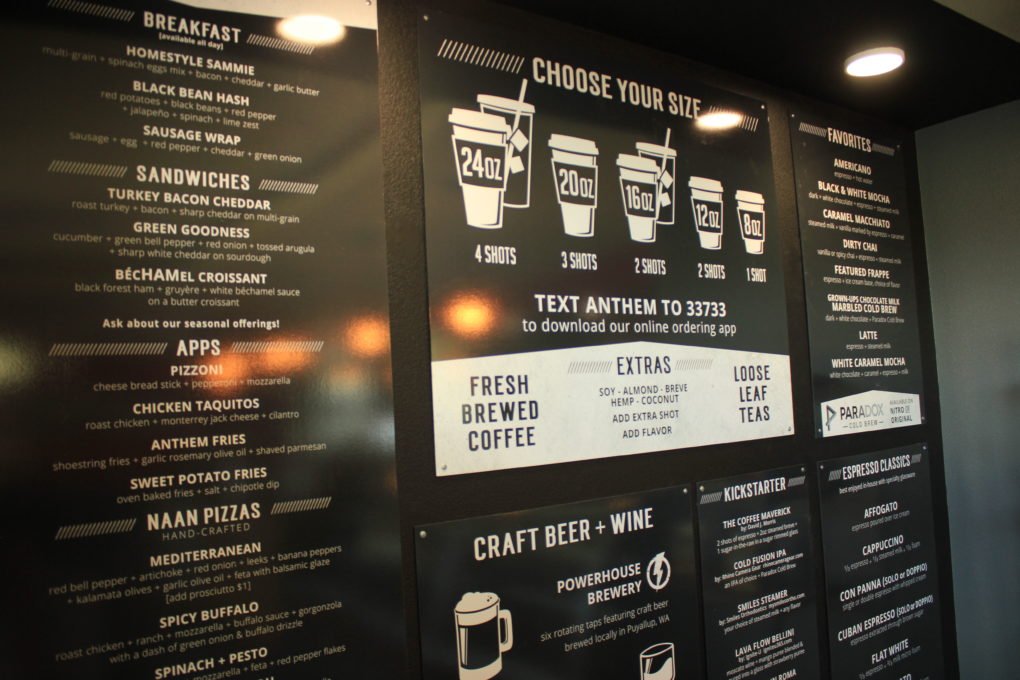
In Their Own Words
Data tells part of the story, but sometimes statistics and graphs from a survey aren’t enough. So we asked a few successful coffee shop owners and business experts to tell us in their own words why coffee shops fail. Here are the best responses we recieved.
The common denominator with all of them is that they lack a really clear sense of purpose. – Bryan Reynolds, Co-Founder and CEO of Anthem Coffee & Tea.
I think businesses fail now because they see how “easy” it has been in the past for shops to open without a lot of business basics and succeed. When I first moved to Denver you could have opened a shop in a location with no parking, no sign, have terrible customer service, weird hours, and no seating and succeed. This was possible because there were no options. If you wanted a great cup of coffee you had to go to the 2 – 4 shops that had great coffee in Denver. The industry is not like that any more. Consumers have shops opening all around them with great customer service, good seating, high visibility, and parking all over. You don’t have to endure bad business to get good coffee any longer, and so the barrier to entry is higher. In short, you have to open a good business to serve good coffee. – Phil Goodlaxson of Corvus Coffee Roasters.
Coffee shops seem like fun, profitable businesses, and they can be, but they are a lot of work. I think they tend to fail because the owner underestimates the amount of work it takes and over estimates the amount of sales they will have. You can’t just open your doors and expect people to show up. – Hannah Ulbrich, proprietress Copper Door Coffee Roasters.

Bad location choice and inconsistency. Also, the world is full homogeneity these days, do something different with your shop and your customers won’t forget you. – Lindsay & Alex Dalton of Weathervane Cafe in Denver.
Having working capital is imperative for those repairs and equipment replacement, slow sales days, and expenditures to help you grow -such as spending money on marketing efforts. The ability to go without a paycheck for like a year, can also help give you some flexibility for those unplanned expenses, especially if your aren’t as flush with capital. – Michelle Ackerman, Owner of Black Eye Coffee LoHi
I really don’t think people know what they are getting into, they think the coffee business is just Fun. In our experience we see business owners who have no idea how to run a business. You need capital, to control your inventory, be hands on and have a great staff that supports your vision. In a small business if you ignore any of these your chance of survival in a competitive industry are threatened. – Erica Lowery, Show Director at Coffee Fest Trade Show.
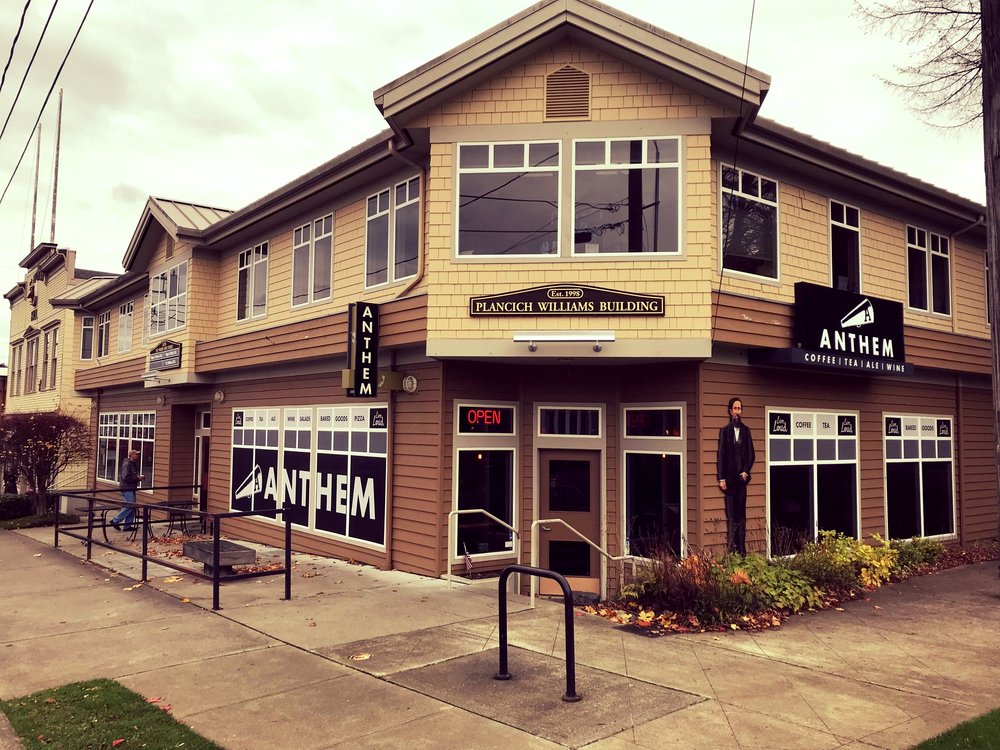
We think coffee shops should be warm, inviting, and play a powerful role in their communities being that third place between home and work that people feel they can be themselves and unwind or chat with the neighbors without any judgment or task at hand. A place to gather and meet new people or chat with the staff. If coffee shops don’t have this culture or ambience it really defeats why it should be there in the first place. We also feel that the owners need to be very involved with creating a certain feel and emotion that goes into everything including the colors, materials, food, coffee, branding and listen to what the market whats and needs.
Be open minded and take feedback seriously. If the owners aren’t around to instill this standard from day one, it can lead to a faulty system and miscommunication to what is expected. It then confuses the community and regulars on what your intentions were. Its a very tough business and showing face and being involved is what’s important, and the most common problem with closures. Understanding the numbers and overhead compared to projected revenue, does it even work or makes sense? Always watching the numbers to be sure its working simultaneously together instead of against each other. – Austin & Tony Ferrari “The Ferrari Bros”, founders of Provender Coffee, San Francisco
Failure is complex. I generally see it break down to three reasons:
- Inability to make disciplined / healthy business decisions.
- Lack of experience in the field – not insurmountable… but it just means you have to work multiple times harder than all your competitors. You’re up against all the challenges that they are, and you’re having to learn the specific product category at the same time – very time consuming. So for every hour your competitors are working… you’re probably working 3!
- People get tired. Lots of cafes close (they might even be doing fine) when the owner / owner(s) decide they want to take the massive amount of time they are investing in the business & invest it somewhere else. – Sam Purvis, co-owner of Good Coffee in Portland
Competition is fierce. It’s hard to do enough volume with so many shops opening. – Jack Kelly, CEO of Caffe Ladro
I would say a lot of independent shops fails because they don’t quite understand what they’re getting themselves into and don’t quite understand the neighborhoods in which they’re opening up. A lot of people see coffee as a quick way to make a buck, but that couldn’t be further from the truth. If you also think specialty coffee will work in just about any neighborhood, it won’t. – Bobak Roshan, founder of Demitasse Coffee
The second half of my business is we wholesale our product to other coffee shops. So we have a unique and inside view of many coffee shops throughout New England. The two biggest issues with indie coffee shops is 1) Profit margins. Coffee is, per pound, an extremely expensive product. You have to ship it halfway around the world from Ethiopia or Indonesia just to get it. Then for your coffee shop to be “hip” you have to have a great location, like downtown Portland Maine with a beautiful brick facade. The problem with this is, that location for your shop coffee shop has to pay some of the highest rent in the city just to be there. And then you only sell a $4 latte? A restaurant in the same spot will be doing $40 per person and an entire family will come in. But a coffee shop has much smaller sales per person. You may not know it, but many coffee shops you see in your town are probably hemorrhaging money. If you’re going to open a coffee shop you need to be extremely prepared and well thought out in your business plan. You need to have many ways to get people in your door to buy things other than coffee. Or you need to really know your market. The second issue is competition. There’s many ways to make coffee at home, and there has been a boom in coffee shops. It is, in my opinion, a flooded market. – Will Hardy, Proprietor of Vagabond Coffee- Maine

Lack of foresight into how much cost and overhead is actually involved in selling 2-5 dollar cups of coffee. Luckily we’ve figured out other avenues of revenue to make it work for us. We have made a well-rounded experience here at See See that has been hard for others to successfully replicate for longevity. It’s definitely a passion driven company here. – Thor Drake, Founder and Creative Director for See See Motor Coffee Co.
Lack of capital. I am in the saturated Seattle market, where it take 2 to 3 years to break even. That is tough to pull off if you don’t have ample capital to start with. – Zack Reinig, founder and owner of Union Coffee
I think the main reason independent coffee shops fail is due to financial reasons (pretty obvious, but I can explain). Landlords overcharging for leases just because they can. Fees for things like opening a commercial account with a utility company ($1,200), rate increases on your business loan, price increases for goods you use to make your product (coffee beans, milk, etc.). Minimum wage increases and lower than predicted sales (customers losing interest or oversaturation of coffee shops) are a handful of things that we have experienced. – Mitch Denison, co-owner of Sparrows Coffee
- Selling just coffee is not profitable unless you buy directly from the growers and sell food to increase the average spending per customer.
- Employees. It is very challenging to have loyal and honest employees who will take care of your business if you are not there, including management. Having consistency requires a good team.
- Payroll is high.
- Very competitive market. – Maria Garcia, owner of Revolucion Coffee House
Lack of focus and good training. – Chuck Jones, small business owner, Jones Coffee Roasters
The writers strike and downturn of the economy in 2008 almost killed my business. Rainy day funds (and good banking relationships) are key! Also, be willing to change as your industry changes… although beware of fads. Finally, know who you are. We are a mom and pop shop and concentrate on the goodness of that. – Shannon Hartman, President/Co-Proprietor at Priscilla’s Gourmet Coffee
Not knowing the business. Not understanding coffee and setting up their store correctly. And one of the biggest is picking the right location as with all low ticket items you need customer volume. – Todd Moore, Founder/President of Cuppacoffee
Main failure in the USA comes from lack of skills. Products are all the same, no originality, no value added. – Sylvain Chailllout, founder, Les Gourmands LLC
Coffee shops fail due to a combination of lack of pre-opening due diligence, an overly optimistic/unrealistic view of the market (“Everyone will LOVE this! Why wouldn’t they!?”), a lack of capital, and finally, a severe lack of empathy for their customers, which rears its ugly head in the form of disconnect customer service. It’s usually a combination of all of these. If I had to pick just one, I’d go with lack of Empathy for their customers. Understanding people on a deeper level can overcome most other obstacles. – Ed Goyette, Founder, BeanTowne Coffee House
From my perspective, some independent coffee shops fail because they aren’t amazing; their convenience/location, their product quality and their overall vibe. – Jullie Love, Community Relations at The Well Coffee House Boston
Lack of money. This for a variety of reasons: maybe due to lack of sales in the beginning, inability to get emergency funding, changing demographics, and, construction in the neighborhood (much of this happened to me). – Nick Parker, owner of Mercury Cafe
Owners start coffee shops without a correct understanding of what it takes to run a coffee shop. They have been a coffee customer but have never been on the other side of the counter. Work in a coffee shop for 1-2 yrs, learn about labor and product cost controls, then make your decision. It’s a different experience on the other side of the counter. – Joel Stenberg, owner of Green Bridge Coffee
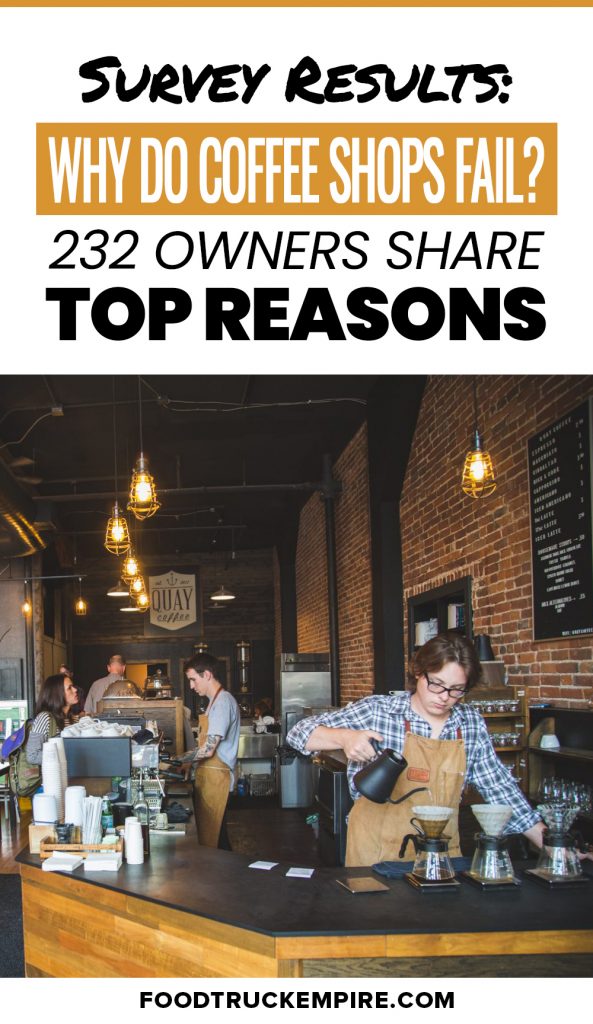
Waste! too much waste and not paying attention to the details. You must be there most of the time when you are an independent coffee shop, so you better love what you do. There are no short cuts. Watch your money and watch your waste. And for Gosh sakes! find a Great (not good) GREAT accountant. – Kerry Krull, founder/owner of Romancing the Bean Cafe
Lack of identity or understanding “Why” they are there in the first place. It is clear when a coffee shop knows or understands their purpose and what they stand for and believe in. This purpose will translate to the customer and the staff and will help engage everyone involved. Creating loyalty that is needed for success. Without the “why”, a business like this can lack soul or feeling and not really connect with the consumer or staff, making it very hard to build up loyalty. – Nolan Hirte, founder/CEO of Proud Mary
The Business 101, meaning all the rules, regulations, and behind the scenes kind of stuff. Plus, LOCATION combined with management. Not seeking out good information, and then not listening to that information – Dan Ollis, owner of Victrola Coffee
Location is always key as many stores do not locate where there is enough density. Also, it is imperative to have enough reserves of cash up front to operate for at least six months as you build the business. It takes time to build your sales. – Jamie Grosse, Co-owner of Barista – Portland, Oregon
Under capitalization. It almost always costs more and takes longer to get operating than one assumes. Operating itself is almost always harder and more expensive than one assumes. On top of this it can take longer to build clientele and related sales. Sometimes you hit it out of the park and the sales are there from day one (which is can be its own kind of problem), but more often than not, a customer base has to be built. – Jeremy Price, Co-Owner and Co-Founder, General Porpoise Doughnuts and Coffee
I’d say there are a lot of factors. With coffee, I think it’s easy for people to adopt a holier than thou attitude when dealing with customers who may be used to the chain coffee shops. That is super off putting, and a great way to lose customers. Just be nice! It’s also a lot of work and a lot of hours, and I think it gets the best of people sometimes. – Travis Coe, Founder and co-owner of Jet Black Coffee Company
I don’t think there is one specific reason. Sometimes people don’t realize that starting a business is like raising a baby, the smaller the baby, the more attention and care it requires. It takes guts to go through the ups and downs any business has and not give up. We put all our attention into the quality of the product and customer experience for people to appreciate it. People feel it when you put love into your business. Your team is also something that should not be overlooked. Your team represents you and your business. If you have nice, friendly, and knowledgeable people who will have your back working for you, you are in good shape. Listening to advice and especially customers feedback is very important too, not to change things up right away because someone said so, but to see if the suggestions are indeed beneficial for you and your business. – Katie Hayes, co-founder at Enigma Coffee
Lack of distinction in the marketplace. There are so many coffee shops that if you are just one of many without anything unique or distinct, you will have a difficult time winning over new customers. People are often pretty set in their coffee routine and need a pretty compelling reason to deviate from that routine. – Chris Hillyard, GM/Co-Owner at Farley’s
There are a couple of reasons that they fail. The first is that their location is bad and the second would be that they care little about the business principles and more about having some fantasy about supplying the world’s best coffees when they really know nothing about coffee to begin with. It takes years to learn about coffee and what makes a great cup of coffee or a great latte. And following the business principles or the equation as I call it, is the only way to make it work. Ie. payroll ,taxes,cost of goods,expenses, profit margins, etc. In the end it really is all about the money. – Jeff Babcock, founder and CEO of Zoka Coffee & Tea, Seattle Washington
Independent coffee houses need to have a mission and vision statement from the beginning. Knowing who you are and what your point of difference are critical. Once you open, everyone will have ideas for you. It is nice that customers are thinking about your business but stay true to who you are. You also need to stay on top of your numbers always, even as a socially responsible business. – Mary Allen Lindemann, Co-founder/owner & Community Builder of Coffee By Design, Portland, Maine
I’ve seen a lot of independent coffee shops struggle when they don’t put enough effort into their repeat customers. Having a solid foundation of customers who are loyal to your brand and come back regularly is really key- a repeat customer costs less to entice back in than a new one, and they also tend to spend more. Easy ways to do this are running a loyalty scheme and making sure your business has a good social media presence. – George Urdea, Co-founder of Nobly POS
Under capitalization and poor management.
I have seen so many restaurants fail due to the owners unrealistic
expectations due to inexperience.
The “I always wanted to have my own bakery” attitude without a clear
understanding of what that actually means.
Hard work, long hours, little rest, employee problems, rising costs, etc.
You also have to be prepared for the worst and have the capital to get you
through these times. No matter how well you run your business there will
always be challenges that will test your will and your pocket. – Richard, co-owner, the Village Bakery and Cafe Fived my undergrad.
Lack of marketing skills and no draw. – Kia Illulian, Co-Founder of Carrera Cafe
Running an independent coffee shop comes with several risks. For example, there could be a fire, someone could slip and fall on the property, or the business could fall victim to a robbery. If you don’t have the proper insurance policies to help you recover, it could put an end to your business. – Jim Loughlin, Senior Sale Director at CoverWallet, a tech company that makes it easy for businesses to understand, buy and manage insurance online.
Bad coffee and terrible staff. – Renee Brown, Vice President of Wild Card Roasters
Related Coffee Industry Content:

